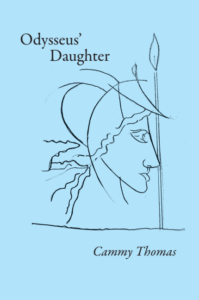 Review by Nicelle Davis
Review by Nicelle Davis
The Odyssey Reimagined: A Review of Odysseus’ Daughter by Cammy Thomas
Odysseus’ Daughter by Cammy Thomas offers a fresh and intimate retelling of The Odyssey, presenting the legendary tale through first-person narratives that breathe new life into its characters. In the first section of the collection, Thomas gives voice to figures often overlooked in the original epic, reshaping the perspective and adding complexity to the well-known story.
These poems reveal a surprising humanity in the so-called monsters. Even the Sirens, whose haunting voices lure sailors to their doom, confess: “We don’t breathe, but / still we smell the dead, / hope ships won’t come, / even as our voices pull them in” (10). The narrative tone of this section takes the reader on a journey through the turbulent waters of love, life, and betrayal.
The collection opens with the poem Laurel, which, like Homer’s invocation of the muse, seeks divine guidance to retell the story of Odysseus. Thomas writes: “I turn towards you my muse / my terror towards / your hyacinth hair curled by wind…” (1). This sense of “terror” recurs throughout the collection, as epic heroes are stripped of their grandeur and shown in their most vulnerable, human moments. Even Penelope, in Penelope, Still Waiting in Ithaca, is no longer the idealized, devoted wife. Instead, she confesses to unfulfilled desires, describing the “mayhem in the desert of (her) bedroom” and admitting, “now I dream of the handsome one” (2). Her longing for the suitors becomes so overwhelming that she surrenders her fight for the kingdom, allowing them to remain in her palace.
Thomas frequently pairs poems to contrast perspectives, presenting the voice of the monster first, followed by the hero’s side of the same story. This contrast is particularly moving in Cyclops, where the blinded monster mourns the loss of his sight, and After the Cyclops, where the voice of a dead soldier reflects from the depths of the sea: “No sign of Odysseus. / Did he even know our names? / Under the waves, crabs scour / my bones, and curly seaweed grows / through my eye-holes” (8). This imagery is haunting, reminiscent of Victor Hugo’s Oceano Nox, where the ocean becomes both a tomb and a womb, cradling countless lost souls.
In the second section of the collection, the tone becomes more lyrical and lusher. Here, Odysseus is reimagined as a lecherous husband and father, embodying a flawed hero “even in the age of cars and planes.” These poems shift focus to the women in the life of an “Odysseus-type” man. Sister, daughter, granddaughter, share his wit and intelligence, but they use their gifts not for conquest. These women rescue the drowning and care for the sick. The haunting language of Thomas’s work can be seen in the title poem,
Odysseus’s Daughter.
The sea is neither green nor gleaming
my boat has nothing of mast or crew
planks and water no wind
no distant speck or stars
I stand under the bow of heaven
words locked in my throat
becalmed the boat sways
gray waves slide up its hull
gods hang above decks
nothing flies in me but fire
This reimagining of The Odyssey balances narrative and lyricism, presenting a timeless epic in a way that feels deeply personal and strikingly modern. Thomas’s retelling connects readers with the myth on a profoundly intimate level, making it immediate and relatable despite its epic scale. By giving voice to marginalized figures, she reinterprets their roles in the timeless tale, shedding new light on the experiences of mythical figures and a better understanding of our own lives.
Odysseus’ Daughter by Cammy Thomas
Parkman Press. 2023. 20pp. $18.00
Nicelle Davis is a California poet, collaborator, and performance artist. Her poetry collections include The Walled Wife (Red Hen Press, 2016), In the Circus of You (Rose Metal Press, 2015), Becoming Judas (Red Hen Press, 2013), and Circe (Lowbrow Press, 2011). The Language of Fractions was recently released from Moon Tide Press.
